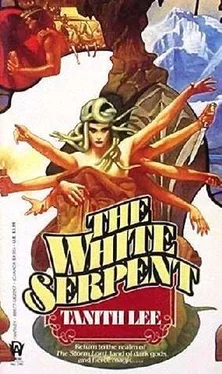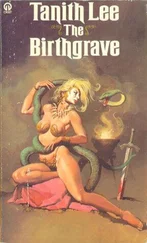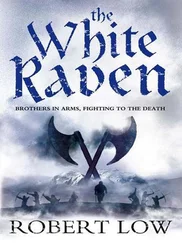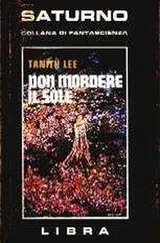Not Yennef, not Katemval, nor Tibo. The stadium had been parent to him, creatrix, and Daigoth, deity of fighters, acrobats and charioteers, Daigoth was his god.
But his mother had reverenced Cah, squat, bloody, and blacker than all other things. . . .
What had driven him was not pride or hate, or rage, or love. If he examined himself, it transpired that he had never validly undergone any of these states, these justifiable emotions of humankind. What motive then, for any of it?
And as he balanced on that height of the unreal yet extant city, he knew that he had lost himself forever. Rehger, like Amrek, was gone into the past.
She sat, almost all that long second day, her hands folded, overhearing the ebb of the struggle within him. It was her Power which made her able to do so, and made her able to endure it.
Then, when shadows had covered all her floor, she put that from her, and rising, sought him.
She loved him, but beside her love for him there was her own destiny, and that of her race. Anackire. She must be two women, the lover, and—his conjuration—the sorceress.
She reached the threshold of the chamber in the scattering sunset.
He stood, arrested, in the center of the room, as if he had been pacing about. He wore the clothes the slaves had brought to him, on her orders. The garments were white, as every piece of good raiment was, here. And in his thoughts a picture lay discarded, of another man in Moih, a dark Vis clad in white for his wedding. (Who this man was she could not tell.)
“Zaddath, or Dorthar,” she said, “will want to hear all you can tell them of my city.”
Were his eyes empty, now? Their blackness seemed to have no depth—like two shutters of burnished iron.
“Come with me,” she said mildly. “Tonight something may happen in Ashnesee that will be of interest to the councils of Zakoris and the Middle Lands.”
“You know so much of me,” he said. His voice was empty, surely. “Everything.”
“Nothing, my dear. Nothing at all. I don’t know if you revile me still.”
All she could decipher now, there in this room of her palace, was the sea-change in his perception. Rollers poured and thundered on the beach. Below, his meditation had become unformed but constant, and like that of a child grown very old.
“You’re inviting me to go with you into the streets of your city,” he said presently, gravely. “If that’s your wish. Yes, goddess.”
“Goddess. You haven’t been tainted by the superstitions of fools.”
“Now I have.”
“Rehger,” she said.
“But I don’t recognize that name you give me,” he said, “that man, that Lydian. He was done for in Saardsinmey. Your lesson, which I have learnt.”
“You misunderstood—” she cried, blindly and suddenly, the liar and lover, now. And at that he moved to her and gently put his hand, curving, quiet, against her face. She remembered so well the warmth, the strength and self-restraint of his formal caresses, the peerless grace of the lion taking her up like a leaf, not to damage her—
She thought, woman’s thought: What have I done? She said, “You suspect you will not return to Zaddath with your news.”
“It seems unlikely. But I’ll go with you now, Aztira.”
She put her own hand against his, and drew away. She closed her heart, and said, “You must walk a step or two behind me. Pardon me, that I ask you to do it.”
“Of course.” He smiled at her. She saw that he was serene. He had surrendered. This was the dignity of the king borne to the public scaffold—again it was she who must rein in wildness and lament.
“No one,” she said, “will think you a slave. We seldom keep secrets in Ashnesee. Some are already aware of the guest of my house. Even to his bloodline. Seeing you, the knowledge will run like fire among them. This isn’t dangerous in itself.”
“No.”
“But you may feel the lash of it. You’re able to shield yourself.”
“I know that, too.”
“An unusual ability in a Vis. The line of the first Storm Lord, Rarnammon, boasts a Lowland strain. Now entirely debased among the Dortharians.”
She walked before him down through the mansion.
At the higher grills and windows, the sunset massed hard, glistening scarlet. Yet, emerging from the vestibule, the west lay over behind the city, more suavely dyed, a flush of amber soaked on silk. The shrine exactly below the house snared the sun on its lid of gold. The rest was darkened like a cloud.
The woman descended the terraces and turned east.
Her whiteness blazing on the dusk, she preceded him along the nameless roads of Ashnesee.
A stairway of stone led into the shallow valley. Night had already gone down into it, and filled the bowl of grass and trees as if with smoke. The towers rose out of the dimness, gleaming, their peculiar cupolas, which were the heads of kalinx and tirr, the slender muzzles of dogs or the hooked visages of birds, blushed like copper. These staring masks had pairs of eyes, crystal windows, each balefully holding the dying sun.
White among the groves, the Amanackire had gathered. There were perhaps two hundred of them, which might be the sum of their numbers in the city. A minority were children, or adolescent. Mostly they looked to be between twenty and thirty years, at the commencement of long adult life for a Vis, the peak maturity of the Lowlander. There were no old ones. Men and women mingled, as the children mingled with the rest, no person or group adhering to another. And their faces, which were, every one, flawless and, if analyzed, beautiful, were as blank as the cut marble faces of the beast-towers, or even of the bred slaves with skins of wood and eyes of mud.
Lamps shone from some of the trees, and stars were coming out, and the big Star itself had got over the rim of the valley sky, red in redness, like a ruby in wine.
Aztira reached the top of the stairway, and Rehger, behind her.
And all the Amanackire, Children of the Goddess, lifted their heads to see, reminding him of the tirr that guarded the plain outside the city.
He did not need mentally to hear the inquisition that washed murmuring through the groves, like urgent ripplings over a pool. Nor how it brimmed against the girl who had brought him here. What answer she gave he did not know. He let the fluttering, saturating needles furl in about him, bore with them, a rock in a tide. Amrek. Perhaps this was the demon they summoned, or it was more subtle, more dreadful. If they were conscious of him as a man he did not guess. He was All-Vis, to them. But to himself, only granite, and their sea of intellect and magic, sweeping over and about, was unable to do more.
After a while the sea furled away again and left him alone.
Then Aztira started to go down the stair, and he followed her.
He had begun, since he had let go, to be aware of her love. And, as long before, her impossible might. (It was these elements, twinned, that had caused him to smile.) Somehow the desperateness of such power awoke compassion.
When she came to the foot of the steps, the people had parted to let her by. There was an aisle of flesh and robes and trees. They walked along it, he and she. It ended against the column of a tower. Thirty feet above, the dog’s head was growing paler on the deepening dark, the eyes had relinquished their rabid glare and turned chill.
The way into the tower was an oval door of white lacquer. Aztira leaned her hand against it, and it opened inward.
The room had been made round, and on its walls were the expected frescoes, pastoral visions, dancers, a beaming solar disc of gold. As in the palaces, lamps had been lit, all up the vault of an inner stair.
By its positioning, the groves and fanciful decorations, he had by now deduced what the area was. A graveyard, and this, one of the tombs. The assembly was not, however, a burial party.
Читать дальше












